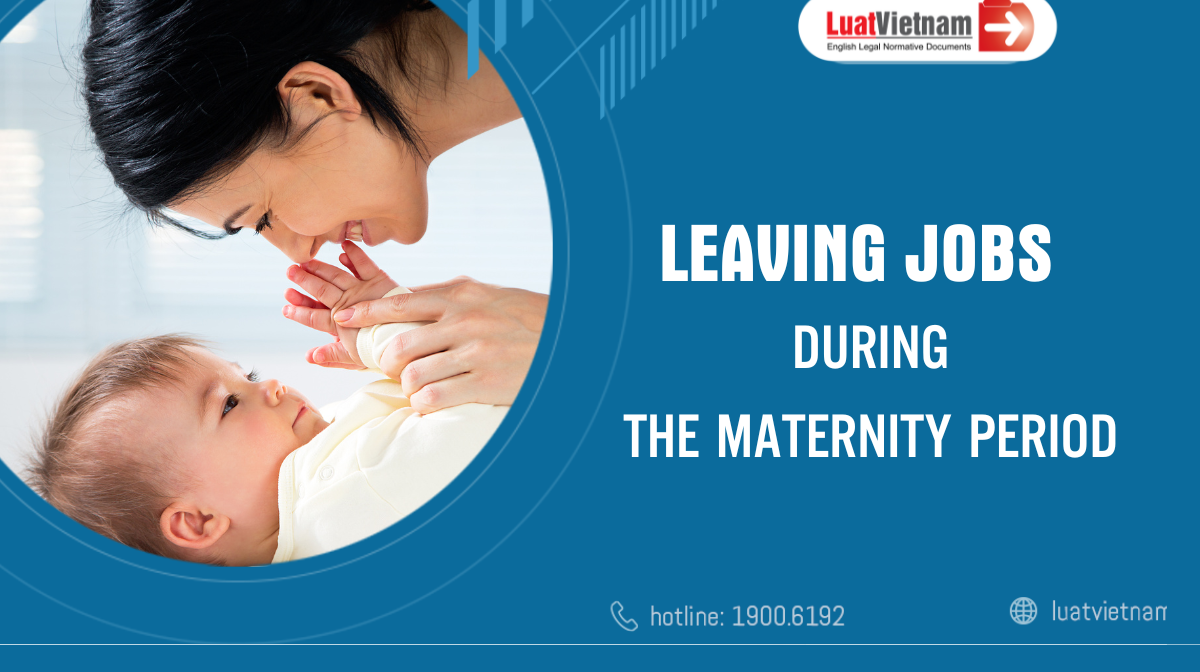Many female employees choose to leave jobs during the maternity period. Whether can female employees leave jobs at their will?
1. Leaving jobs during the maternity period
In accordance with the provision prescribed in Clause 1, Article 35 of the Labor Code 2019, the employee may unilaterally terminate his/her labor contract provided he/she shall notify such termination to the employer.
The notification time is prescribed as follows:
Type of contract | Time |
Special occupations, professions, and jobs include: Aircrew; aircraft maintenance technicians and aviation repairmen specialists; and flight dispatchers; - Enterprise managers as defined in the Law on Enterprises and Law on Management and Use of State Capital Invested in Production and Business at Enterprises; - Crewmen working on board Vietnamese ships that currently operate overseas; and crewmen leased by Vietnamese enterprises and working on board foreign ships; - Other cases specified by law. | |
For indefinite-term labor contracts or labor contracts of a term of at least 12 months; | At least 120 days |
For labor contracts of a term of under 12 months. | At least equal to one-fourth of the term of the labor contract |
For other occupations, professions, and jobs: | |
In-definite-term labor contract: | At least 45 days |
Definite-term labor contract from 12 months to 36 months | At least 30 days |
Definite-term labor contracts of a term of under 12 months. | At least 03 working days |
Therefore, the female employees must notify within the above term for leaving jobs during maternity. And then, the employer shall terminate the labor contract with the employee.

2. Receive social insurance premiums when leaving jobs in the maternity period
In accordance with Article 31, Law on Social insurance 2014, Female employees who are pregnant or giving birth to children must satisfy the following conditions to enjoy the maternity regime:
- Female employees giving birth to children: Employees must have paid social insurance premiums for at least the full 6 months within 12 months before childbirth or child adoption.
- To enjoy the maternity regime, employees who need to take a leave during pregnancy for pregnancy care as prescribed by a competent health establishment: Must have paid social insurance premiums for at least full 3 months within 12 months before childbirth.
Clause 4, Article 31, Law on Social Insurance 2014 also points out clearly that employees who fully satisfy the conditions and terminate their labor contracts or working contracts or cease working before the time of childbirth or the time of adoption of under-6-month children are still entitled to the maternity regime.
It can be seen that the maternity regime is decided by the time of paying social insurance premiums before giving birth to children. Employees are allowed to receive a maternity regime whether they leave their jobs or not.

3. Convalescence and health rehabilitation after the maternity leave period
Pursuant to Article 41, Law on Social Insurance 2014, female employees can receive convalescence and health rehabilitation after the maternity leave period if satisfy the conditions as follows:
- Female employees are entitled to a 6-month leave before and after childbirth under the maternity regime. For a female employee who gives birth to twins or more infants, she is entitled to an additional leave of 1 month for each infant from the second.
- Come back to work
- Female employees whose health has not yet recovered within the first 30 working days after the maternity leave period
Employees are entitled to a leave for convalescence and health rehabilitation of between 5 and 10 days (including public holidays, New Year holidays, and weekends). The leave period for convalescence and health rehabilitation is inclusive of public holidays, New Year holidays, and weekends. The leave period for convalescence and health rehabilitation which lasts from the end of a year to the following year shall be counted for the previous year.
Here is the important information relating to leaving jobs during the maternity period.



![[Update now] Personal income tax policies 2026: 05 major changes](https://image3.luatvietnam.vn/uploaded/500x285twebp/images/original/2026/02/25/update-now-personal-income-tax-policies-2026-five-major-changes_2502135544.jpg)






